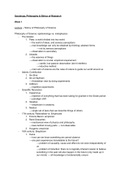Summary
Summary Sociology, Philosophy and Ethics of Research
- Course
- Institution
- Book
This summary includes notes from the lectures and summaries of the literatures under 'seminars', completely with additional question for studying or to start a disscusion in the seminar group.
[Show more]




